From Surviving Pogroms to Meeting Gaddafi: David Gerbi's Remarkable Journey
The escape from the pogroms, assassination attempts by Gaddafi's envoys, and a face-to-face meeting with the Libyan dictator. In an exclusive interview, David Gerbi reveals his unbelievable life story.
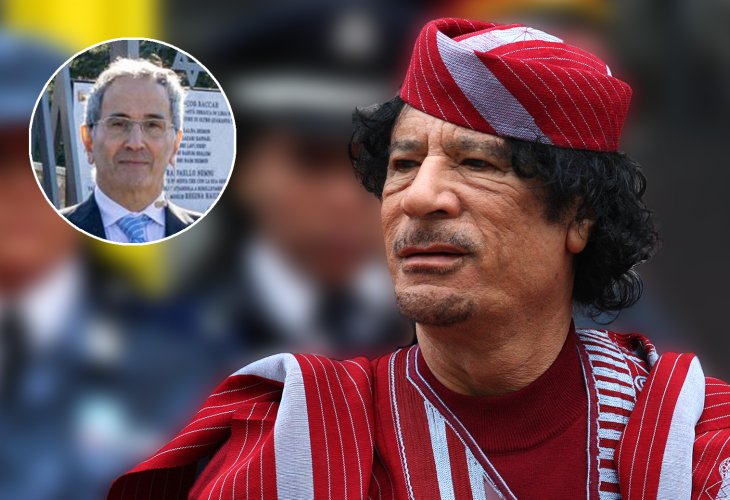 Inset: David Gerbi (background photo: shutterstock)
Inset: David Gerbi (background photo: shutterstock)This is a moment David Gerbi will never forget: a lone, small child running through the empty streets of the Jewish quarter in Libya during a brutal pogrom. His life has seen many turbulent moments, from being thrown into a Libyan jail surrounded by dozens of Muslims, to Gaddafi's envoys attempting to assassinate him, and the surreal meeting with the Libyan dictator who shook his hand with a fake smile.
Gerbi, 68, a psychoanalyst and representative of the Libyan Jewish organization in Italy, begins his story in 1967—when the last pogrom against Libyan Jews occurred. "This happened after the Arab countries' defeat in the Six-Day War against Israel," he recounts. "Until then, we led a peaceful coexistence with the Arabs, despite a constant underlying fear. When the pogrom began, we physically felt that fear."
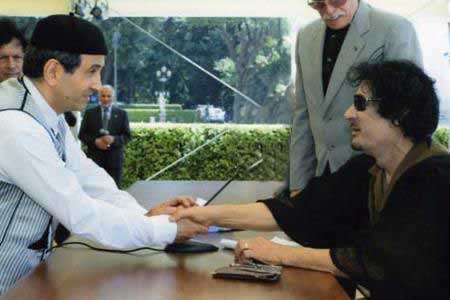
"The Arabs Shouted 'Slaughter the Jews'"
"I still remember that night," Gerbi recalls. "We sat in our home in Tripoli; it was late when suddenly over the radio, we heard Egypt's President Nasser declare in Arabic, 'My Muslim brothers, go out into the streets and kill the Jews.' This announcement led to the huge pogrom against Libyan Jews. Arab factions stormed the Jewish quarter, screaming 'Slaughter the Jews.' The pogrom began with looting and burning shops in the Jewish quarter and ended with the murder of dozens of Jews. There was mortal fear in the streets, and for 40 days we barricaded ourselves in our home, not daring to step outside."
What did you do during all those days? How did you obtain food and drink if you didn’t leave the house for 40 days?
"In the early days of the pogrom, our Christian neighbors and even some Muslims took pity on us and passed food through to us. However, this stopped when extremist Muslims reported them, and police arrived at the homes of those helping us, threatening arrest if they continued. Our large family needed a constant food supply, and my parents didn’t know what to do—until we found a solution. I was a small and quick child, and my parents decided that every morning I would sneak out very early to bring food home. Every day, I would stealthily run to the market alone, unnoticed by the soldiers, and quickly return home."
And what happened after 40 days?
"We fled Libya. Most families, about 5,000 Jews, escaped during the first week of the pogrom, but we delayed because my father wouldn’t board a flight and preferred waiting for a ship. We were the only family that left Libya by ship. We arrived in Italy as refugees, without money or basic belongings, and had to rely on the Joint Distribution Committee."
"It Was Hard to Find Someone Willing to Meet Gaddafi"
Thirty-five years after fleeing Libya and settling in Italy, Gerbi received a greeting from his homeland. He learned that his aunt was one of the last two Jews still living in Libya. "It turned out that after we escaped, seven Jews remained in Libya, preferring to stay in their homeland despite the high risk," he recalls. "Over time, most of these Jews passed away, leaving just two isolated Jewish women in Libya; one was my aunt."
After negotiations with the Libyan authorities and through mediation by Musa Kusa, then-head of Libyan Security Services and one of Gaddafi’s closest aides, Gerbi returned to Libya to meet his aunt. "The reunion was very emotional," says Gerbi. "But more than anything, I was moved by the fact that I returned with dignity to the country from which I was disgraced. Hashem helped me."
"At that time, Gaddafi was trying to normalize relations with the USA after the economic embargo imposed on his country, and he conditioned transferring my aunt on my mediation between him and American entities," continues Gerbi. "I began looking for a well-known public figure from the USA willing to meet with Gaddafi and speak with him, but found no one. Gaddafi was blacklisted as a terrorist, and it was extremely challenging to find anyone daring to meet with him."
Thirteen months after his visit to Libya, and only after finding a mediator willing to meet the tyrant, did Gaddafi permit Gerbi's aunt to transfer to Italy. After 40 days in Italy, his aunt passed away, and Gerbi moved her body to Israel. He emphasizes that unlike his aunt, who received a proper burial, the Jewish cemeteries in Libya were destroyed during the pogroms, replaced with residential buildings. "This led me to work on a special project to restore the Jewish cemetery in Tripoli. I created a physical restoration in Rome and recently completed a virtual restoration of 2,500 destroyed graves at the cemetery, including the names of the deceased and the ability to light a candle in their memory."
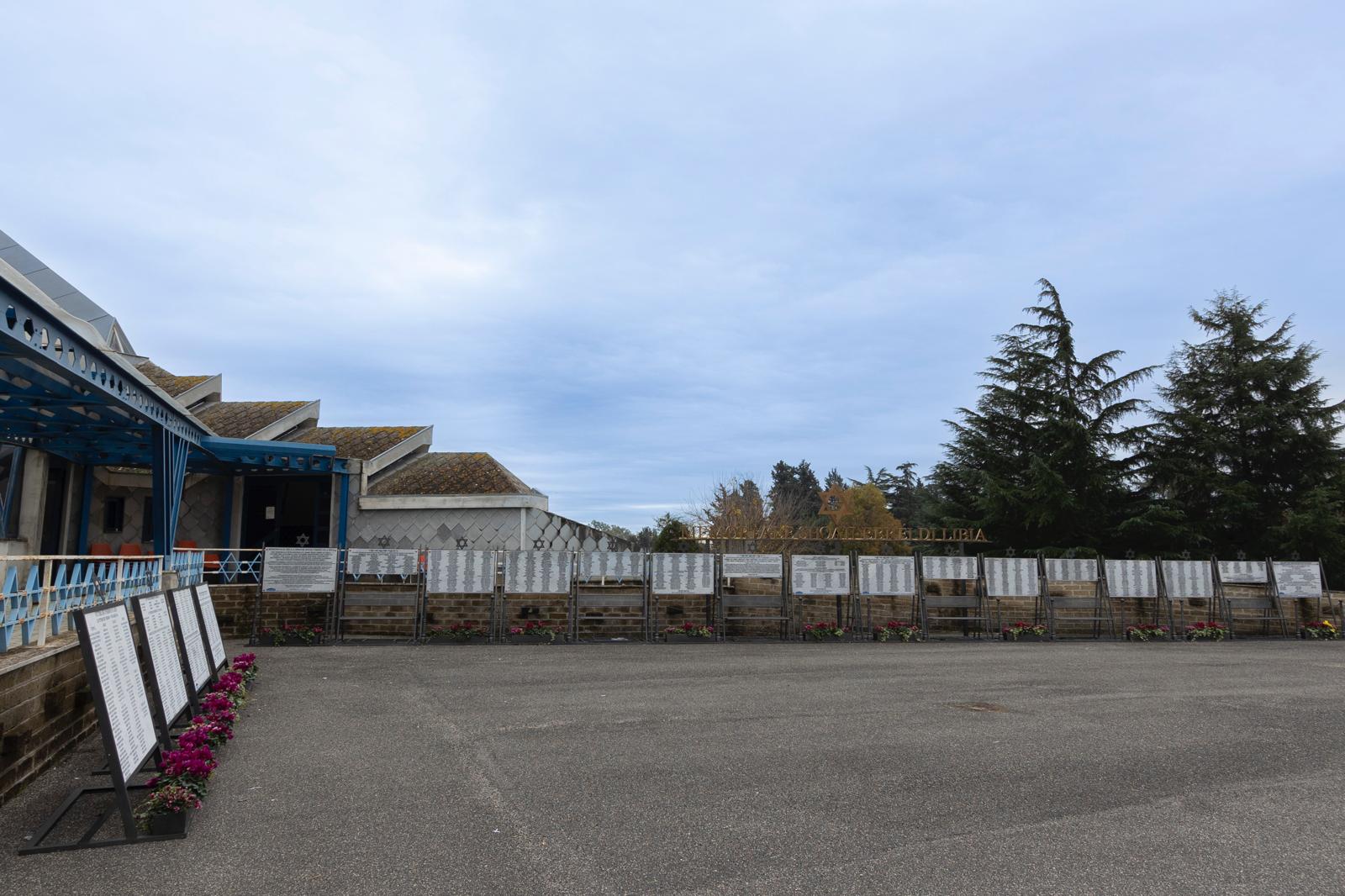 Reconstruction of the Libyan cemetery in Italy
Reconstruction of the Libyan cemetery in ItalyAnd what about all the bones removed from the cemeteries?
"When the Libyan authorities demolished the cemeteries, they gathered all the bones from the graves and stored them in a warehouse. My dream is to bring all these bones to Israel and establish a large communal grave. I previously met with Minister Eli Cohen while he served as Foreign Minister and tried to advance this initiative with him."
As a representative of the Libyan Jewish organization in Italy, Gerbi seeks to promote additional projects related to the Jewish heritage in Libya, including the restoration and preservation of the Great Synagogue of Tripoli and dealing with the abandoned properties of Libyan Jews. He’s also trying to promote Jewish and Israeli tourism in a country that currently lacks diplomatic relations with Israel. "I’ve met with many public figures to advance these projects. With Hashem’s help, I hope to succeed," he says.
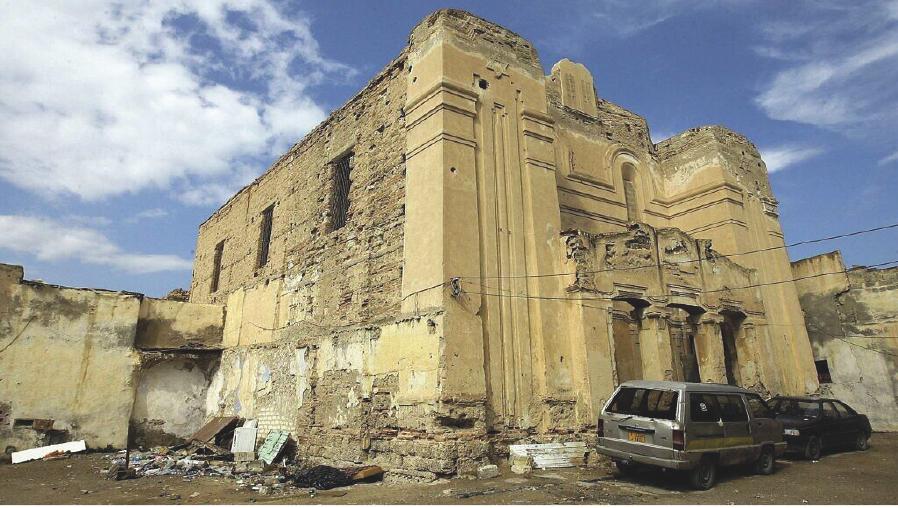 The abandoned synagogue in Tripoli
The abandoned synagogue in Tripoli"I Survived the Worst Death Imaginable"
Gerbi explains that after finding an American representative willing to meet with Gaddafi, the Libyan authorities regarded him as a peace ambassador between them and the U.S., initiating normalization with the Western countries. To his surprise, he received an invitation from Gaddafi for another visit to Libya: "I traveled the country day and night, horrified by the destruction in the Jewish neighborhoods. I also entered the Great Synagogue in Tripoli and prayed there. Honestly, I wondered why Gaddafi allowed such freedom, but I didn’t ask too many questions."
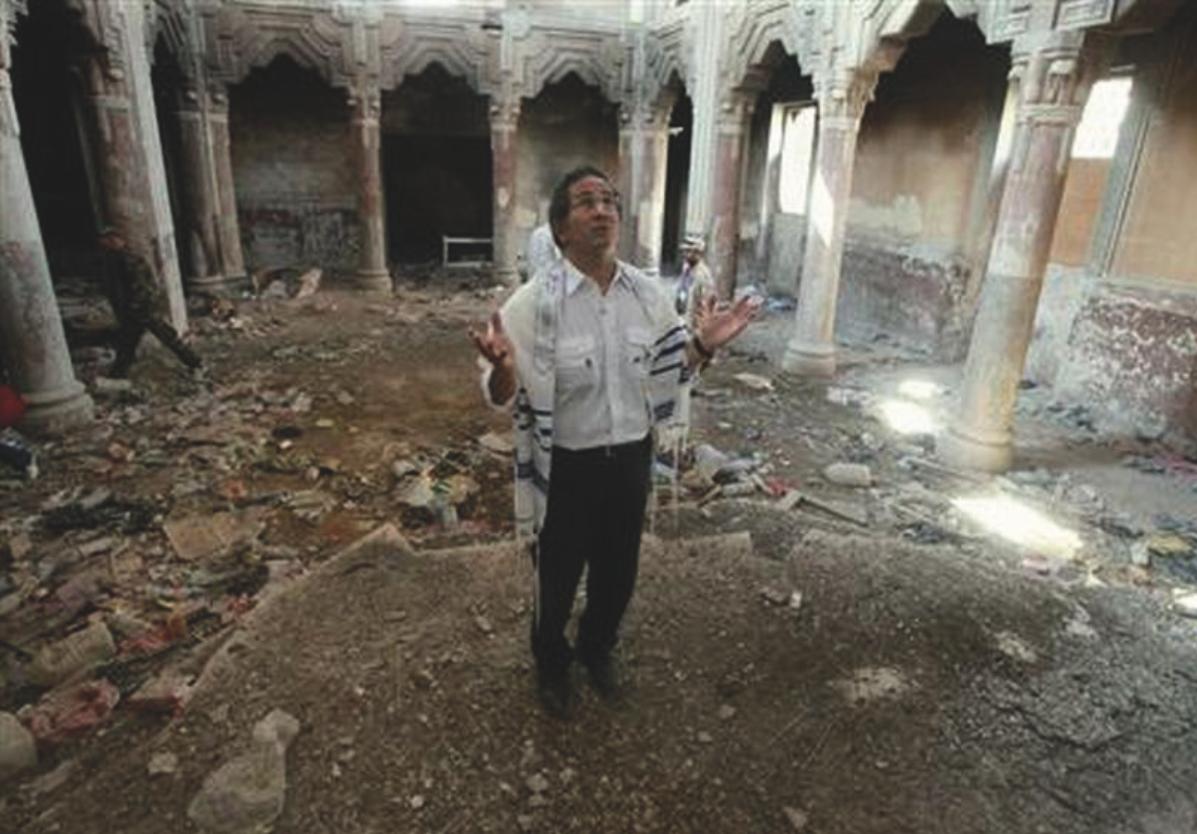 Gerbi at the abandoned synagogue in Libya
Gerbi at the abandoned synagogue in Libya"Then, one night while wandering the Jewish quarter, the moment I feared arrived," Gerbi remembers. "A group of police officers brutishly pounced on me, and within minutes I found myself in jail, cramped with 35 Muslims in a tiny cell. They surrounded me, eager to kill me, suspecting I was an Israeli spy."
What did you do in those moments? How did you handle the fear?
"I was afraid, but not too much. Let me tell you more: the interrogators looked for incriminating evidence in my personal belongings. When they found the *tefillin*, they began shouting, 'What is this? What is this? Here’s a spy.' I explained, 'It’s for praying.' I took the *tefillin* from them, put them on, demonstrated how a Jew prays, and said in Arabic, 'I only fear Hashem.' Suddenly, there was such silence in the room that to this day I can’t forget. All the Muslims backed away when they saw my courage and faith in Hashem facing the investigators."
"After substantial efforts and utilizing connections, I was abruptly released after a day and a half. I fled to Israel with all my life force. They knew my address in Italy, and for three months after the event, they searched my neighborhood. They intended to kill me, but fortunately, I was in Israel during that time."
Who were those that wanted to kill you?
"They were called 'The Death Envoys.' These were Gaddafi's armed forces, who carried out assassination missions globally on his behalf and then erased all evidence. Hashem saved me from the worst death imaginable."
"I Met Him in Rome"
Gaddafi was the leader of the 1969 Libyan military revolution. Throughout his long reign, he was responsible for a series of mass terrorist attacks, such as bombing Pan Am Flight 103, which killed 270 passengers and crew, as well as involvement in PLO terrorist attacks. His cruelty shocked the Western world, leading countries like the U.S. to attempt his elimination. Gaddafi roamed with African mercenaries and armed female guards known as "The Revolutionary Nuns" and "Amazon Guard." Attempts to assassinate him failed—until 2011, when he was killed by Libyan rebel forces.
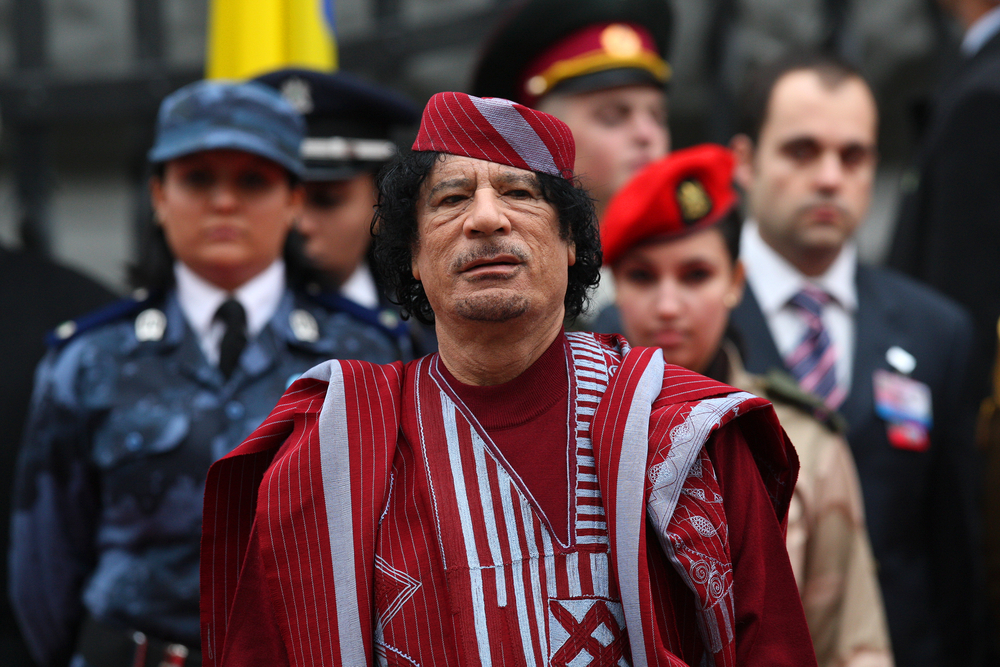 (Photo: shutterstock) Gaddafi
(Photo: shutterstock) GaddafiGerbi has forgotten the number of times Gaddafi attempted to assassinate him, but he will never forget their meeting: "Eventually, I met him in Rome, during his flamboyant visit with his massive tent, surrounded by soldier battalions," Gerbi concludes his daring tale. "He shook my hand and flashed a fake smile. At that moment, looking into his eyes, I realized from what kind of beast I had been saved."

